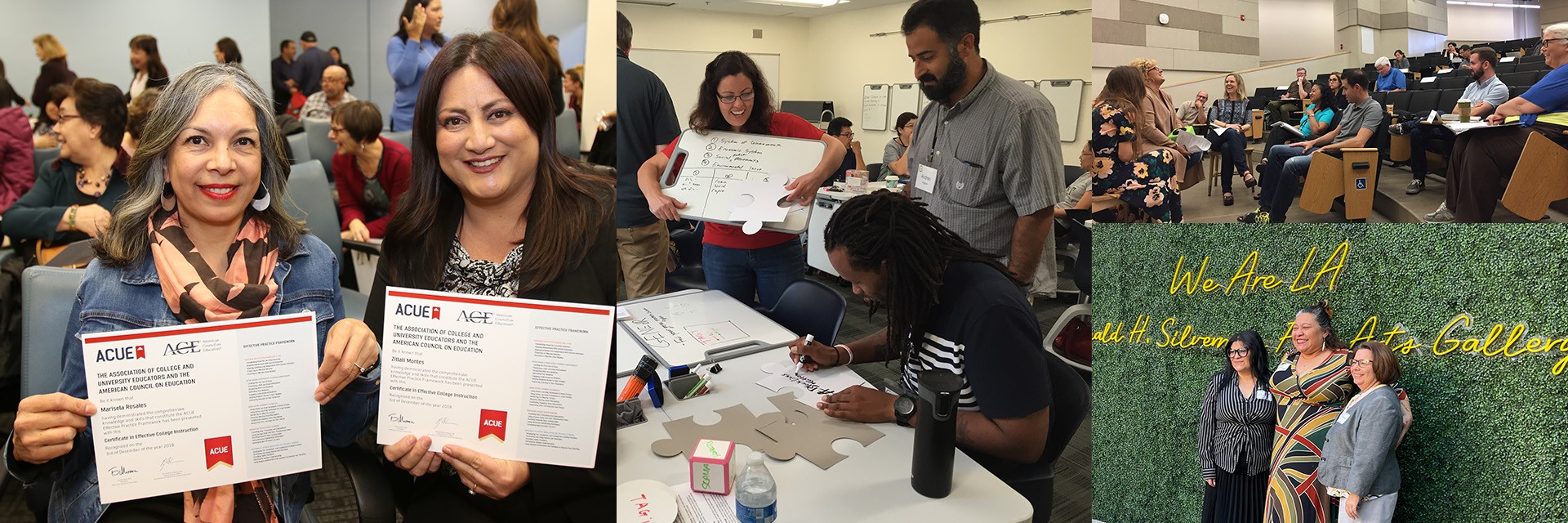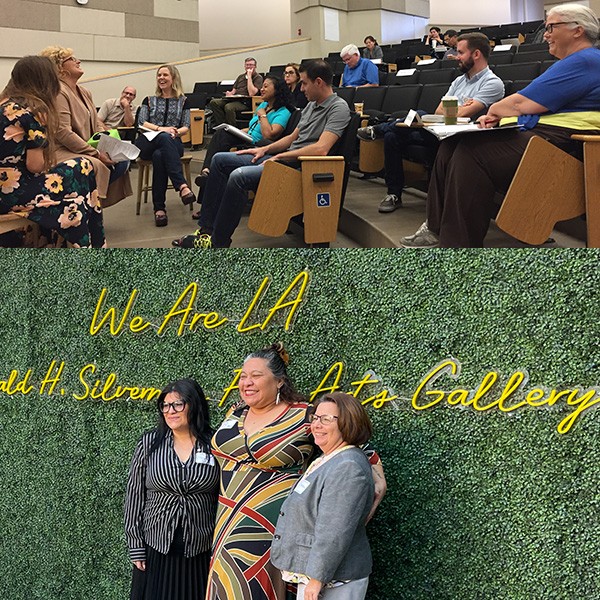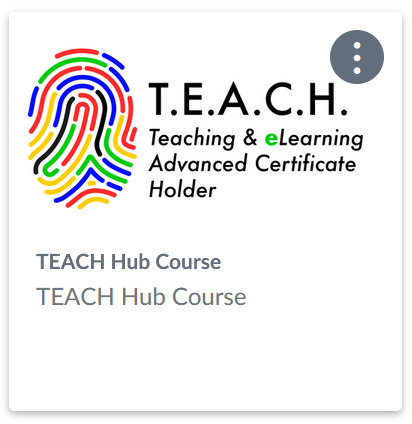Consider taking our other robust programming: ACUE, Career-Engaged Learning, Inclusive Teaching, and the Online Course Development Program.
Our T.E.A.C.H. program features four pathways each investigating a critical theme in teaching and learning. T.E.A.C.H. replaces former programming, including the TECH certificate, Teaching Project certificate, and ALT-Instruction certificate.
The Four Pathways
Each pathway features one of four specific themes: 1) technology, 2) course structure, 3) student engagement, and 4) assessment.
Complete a single pathway to earn a badge. Complete all four pathways to become a Teaching & eLearning Advanced Certificate Holder (T.E.A.C.H.) and you will receive your program certificate.
T.E.A.C.H. encourages you to go at your own pace. With flexibility in mind, programming includes a mix of live webinars and self-paced courses. Put what you learn into practice by sharing ways you’ve changed your teaching practice. Simply complete a short assignment or activity for each online webinar or workshop. Faculty who have taken programming with us may recognize several of these workshops and will receive credit towards any prior workshop. However, a short deliverable is now associated with each workshop.
We highly recommend the T.E.A.C.H. program for faculty new to teaching at Cal State LA. All instructors of record, including lecturers and graduate teaching assistants (TAs), are welcome to participate in CETL programming.
Please Note: Full program coming 2024.

Canvas and Our Students
Starting Canvas with Online Activities and Assignments
Canvas Gradebook and SpeedGrader
Leveraging Multimedia
Teaching Our First-Generation Students

Structure
Transparent Assignment Design and Rubrics
Accessible Instructional Materials
Student-Centered Syllabus
Organizing Your Course

Engagement
Check for Understanding
Motivating Students in Your Course
Showing Students You Care
Discussing Discussions
or
Productive Group Work
or
Gathering Feedback From Students
Coming Spring 2024

Assessment
Formative Assessment
Writing Smarter Test Questions
Cheating 101
Grading Best Practices
Webinars and workshops in the TEACH series will be regularly offered, so check your Monday email from CETL or our calendar at: /cetl
Webinar Resource Courses
After attending any webinar, you'll automatically be enrolled in a Resource Course in Canvas. Use the resource course to complete any required assignment. You can also access the slides and materials featured in the webinar.
The resource course should appear on your Dashboard within 48 hours. If you’re unable to find it, please check Courses (global navigation on left) > All Courses.
Please visit CETL Virtual Support for additional assistance.
Frequently Asked Questions
Visit the TEACH Program FAQs page for additional information.
You can track your progress in completing workshops for the program through the TEACH Hub Course.
Webinar and Self-Paced Course Descriptions
Teaching With Technology
Description
In this self-paced course, explore the essentials tools and features of Canvas. Learn how to use Modules, Quizzes, Assignments, Discussions, and Rubrics. You'll also have the option to check out: Roll-Call Attendance, Prerequisites and Requirements, and Scheduler (Canvas Calendar).
Workshop Objectives
- Explore activities that can be used to foster collaborative and more active learning in the online portion of your course.
- Design a low stakes activity for a particular assignment you have in mind for your courses, such as a survey, poll, discussion, or reflection assignment.
- Explore the following Canvas tools: module, quiz, assignment, scheduler, discussion, rubric, and roll call attendance.
- Configure prerequisites or requirements within Modules or Assignments.
Description
In this self-paced course, learn how to configure the Canvas Gradebook to provide students up to date information on their progress in the course. You'll also learn how to use the SpeedGrader for efficient grading workflows, and providing students timely feedback.
Workshop Objectives
- Describe the purpose of grades and grading in a course.
- Recognize the defining characteristics of the two main gradebook types, Points Based and Weighted Percentages.
- Identify the correct setup procedures for both gradebook types, extra credit, and dropping the lowest score.
- Interpret the various visual indicators for student submission and grading status.
- Select features within SpeedGrader for efficient grading and student feedback.
- Explain the importance of changing empty/missing grades to zeroes (0).
Description
In this self-paced course, learn how to best utilize media in your course to free up design and engage students. You'll also learn how to find pre-existing videos and online content to help supplement your course.
Workshop Objectives
- Define and identify known OERs for various contents.
- Use the Canvas Rich Content Editor to embed an image or video.
- Identify the need and practice of web-accessible instructional content.
- Apply the general rules of Copyright in Education using Canvas Commons.
Description
Do you know that more than 50% of your students have parents who do not have a bachelor's degree? These students are determined to succeed. However, they do not have informal guides, such as their parents, to orient them to the college experience. In this self-paced course, you will list their challenges and different strategies to incorporate first-generation students into the fabric of your teaching and the university as a whole.
Workshop Objectives
- Distinguish challenges first-generation students face from their non-first-generation counterparts.
- Define hidden curriculum and impostor syndrome.
- Identify strategies to help support first-generation students in your classroom.
Structuring Your Course
Description
Students in classes that used more transparency report gains in academic confidence, sense of belonging, and skills like group work and using written and oral communication. All students report benefits, but first-generation and underrepresented students reported even greater benefits. In this workshop, see how transparently designed assignments offer equitable opportunities for all college students to succeed.
Deliverable: Transparent Assignment
Workshop Objectives
- Identify the need for Transparent Assignment designs.
- Explain how Transparent Assignments help students succeed.
- Define what makes a Transparent Assignment.
- Apply the Transparent Assignment Template to an existing assignment.
Description
An important component of designing and building an online or hybrid course is to ensure that the instructional materials are accessible for students with disabilities. In this workshop, we will demonstrate several things instructors can do to ensure accessibility of their course materials.
Deliverable: Accessible Syllabus
Workshop Objectives
- Explain the importance of accessible materials.
- Structure text documents with Heading Styles.
- Add a text-based description to an image (alt text).
- Assess closed captioning quality in online video.
Description
Designing an organized, student-center syllabus is a high-impact practice that promotes student success, especially for first-generation students. Your syllabus gives learners the first impression of your course and sets the tone. In this workshop, learn about practical ways to create a student-centered syllabus and discover resources to help get you started.
Deliverable: Revise a Course Syllabus Policy
Objectives
- Identify the benefits of student-centered, equity-minded practices in a course syllabus.
- Practice incorporating student-centered language into an existing syllabus.
- Discover CETL resources that help you build an effective student-centered syllabus.
Description
Being online is disorienting! Have you ever looked at your Canvas course and thought, "Why is it organized this way?" Nothing seems to fit together, maybe it's a bit messy. On mobile, you scroll forever; you open files in another application; and shift back to Canvas. Is there a better way?
In this self-paced online workshop, see how weekly overview pages and modules can help organize your Canvas course. Overview pages (1) welcome and introduce students to the week; (2) summarize the upcoming assignments and activities; and (3) show students the connection between assignments and learning outcomes.
With overview pages and organized modules, both you and your students navigate your course with ease. Your Canvas course turns into an organized learning environment and place where you all want to create, think, apply, and share.
Deliverable: Completion of 3 Knowledge Check Quizzes and Sample Overview Page
Objectives
- Describe navigational or structural issues students may have had participating (getting around) in your course.
- Determine how to use sections of a syllabus to structure a Canvas course.
- Identify how to structure a module and its overview page to explain how learning will proceed (flow).
- Identify non-measurable language in student learning outcomes/objectives.
- Connect how a module's activities relate to the student learning outcomes in the syllabus.
- Organize a week of the course using the Overview Page template.
Engaging Students
Description
Having trouble getting students to participate in your synchronous class meetings? This 45-minute active webinar will demonstrate ways to check for student understanding. In this demonstration and practice, we will model how to use various tools to make sure students understand your course content, and how to keep students engaged during your Zoom sessions—all without needing to see students on camera.
Workshop Objectives
- Discuss what "Check for Understanding" means.
- Introduce tips and tricks to use in synchronous meetings to engage students.
- Identify prompts you can use to check for understanding.
- Model and practice checking for understanding.
Description
Does it feel like students are not keeping up in your remote instruction course? Are you looking for practical strategies to motivate students through the remainder of the term? Join us for a new webinar on how to motivate students in your course. You'll identify reasons students may be motivated (or demotivated) and how you can improve student motivation to help them succeed in your course.
Workshop Objectives
- Identify reasons why students may be motivated (or de-motivated) in your course.
- Discuss how modality (e.g., F2F, remote instruction, and fully online courses) and structure can impact student motivation.
- Identify how you can improve student motivation in your course.
- Review the importance of Structure, Instructor Presence, and Social Presence to help improve student motivation.
Description
Have you noticed your students are stressed out and disengaged? Have you wanted to show students you care about their well-being but are not sure how? Join us for this new workshop where we will discuss ways to build care into our courses and teaching. You'll learn about resources to support student well-being on campus and strategies you can incorporate into your teaching to show students you care.
Deliverable: Completion of Caring Teaching Practices Implementation Plan
Objectives
- Explain the need for incorporating care into your teaching.
- Discuss strategies for connecting with students.
- Discuss strategies for faculty self-care and self-reflection.
- Identify how you can build care into your course.
Description
Have you planned the perfect online discussion forum only to have it fall flat? Do you end up with low participation or simple answers and believe discussion forums are not worth the time and effort they take to create or grade? Come discuss discussions and discover how to increase participation, decrease grading time, and actively engage students with their peers and your course material.
Deliverable: Discussion prompt and rubric
Objectives
- Discuss how and when to effectively use discussions in your course.
- Discuss the importance of the discussion prompt.
- Discuss ways to motivate students to actively engage in online discussions.
- Discuss tips and tricks for moderating and grading discussions.
Description
The ability to work in teams is a hallmark of the 21st-century workplace, requiring a mix of interpersonal, problem-solving, and communication skills. Having students work in groups is also an efficient way to manage your course. Unfortunately, productive group work is also rare; many group assignments fall flat in the classroom because we fail to understand students’ interests, rights, or sense of power.
In this workshop, we’ll discuss what motivates people in groups and help you set up an assignment that gets the most out of every student. Bring a current example of a group project you use (not necessary to participate).
Deliverable: Faculty will use a Career-Engaged Group Assignment or Activity template and a Team Work Toolkit to create a transparent, structured group assignment or class activity for your students.
Objectives
- Reflect on the role of teamwork in your career journey, your discipline, and the courses you teach
- Identify differences between groups and teams and elements of effective group work
- Discuss how group projects prepare students for a post-pandemic workplace
- Discuss the importance of social belonging in building effective teams and group work
- Discuss how the Team Work Toolkit applies career-relevant pedagogy to group projects
Measuring Student Success
Description
Instructors committed to inclusive teaching can revolutionize student learning using formative assessment. In this special two-hour webinar, we will model in real time the 7 formative techniques and their related activities.
Formative thinking helps students take responsibility for their own learning, a precondition for improvement. It also challenges our assumptions about what "assessment" looks like in any environment.
We will demonstrate multiple creative activities that can be integrated into a class session—or the entire term. Participants will be asked to complete a short survey prior to attending the webinar.
Deliverable: Five Item Knowledge Survey
Workshop Objectives
- List 7 techniques (moves) of formative assessment.
- Apply a variety of formative activities in your classroom—and across your course span—to foster inclusion.
- Describe how formative assessment is naturally inclusive.
- Reflect on your role in becoming a formative thinker.
Description
Writing multiple choice test questions, also known as item writing, is art and science. A well-constructed MC question is versatile, reliable—and reusable! Learn when to ask what type of question, and why. In this workshop, we will review the steps to writing equitable tests. Please bring a copy of a current quiz, test, or exam to work on.
Deliverable: Revised Test Questions
Workshop Objectives
- Discuss the differences between essay and multiple choice questions, and when to use each type.
- Identify specific, efficient, items that reward "higher order" thinking.
- Identify kinds of questions that deter cheating.
- Identify other "Smart" test taking and item writing practices.
Description
Having trouble with students cheating on tests? Dive into our practical, equity-based approaches that mitigate this stressful issue that arises during in-person and remote instruction. Learn about how cheating environments are created and practice modifying your assessments and course design to discourage the motivation to cheat. See how faculty have implemented new strategies to help eliminate cheating on assessments.
Deliverable: Rules of Engagement Document for students
Workshop Objectives
- You can identify conditions that create cheating environments.
- You can reflect on how assignment design strategies can reduce cheating.
- You can practice incorporating explicit guidelines and expectations for test-taking.
- You can describe how social learning positively benefits students’ motivation, understanding, and retrieval-- and consider building social learning into your assessments.
Description
Do you want to save yourself the time, guesswork, and headache of grading? Are you looking for ways to grade equitably and effectively? This workshop will guide you in setting up equitable and consistent grading practices that are bias-resistant, maintain academic standards, increase student motivation, and that will help ensure your course grading practices accurately reflect your student’s academic level of performance.
Deliverable: Grading Best Practices Document
Workshop Objectives
-
Identify equity-minded grading practices.
-
Reflect on your current grading practices and how they can be modified to improve equity and student success.
-
Explore alternate grading systems, assessment strategies, and forms of instruction.
-
Determine the specific, observable, and measurable skills for your students to achieve and align your grading with those specifications.
-
Define the scope of your assessments and explicitly share those criteria with your students through transparent instructions and rubrics.
-
Revise an assignment to include equity-minded grading practices and a student-centered rubric.





 Self-Paced—Enroll Now
Self-Paced—Enroll Now